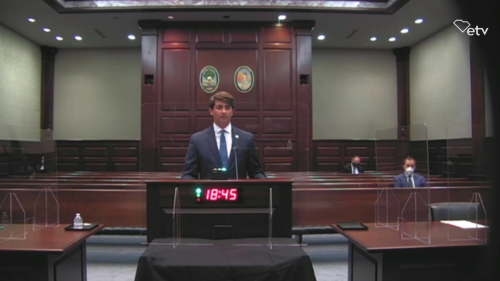SC justices reopen courtroom with school funding lawsuit
PPI President and CEO Ellen Weaver was quoted in the Associated Press regarding the overwhelming parent demand for SAFE Grants.
COLUMBIA, S.C. (AP) — Meeting in person for oral arguments for the first time since the start of the coronavirus outbreak, the South Carolina Supreme Court heard arguments Friday over whether Gov. Henry McMaster has the power to direct $32 million in federal pandemic relief funds to private schools.
A central question of the lawsuit filed against the governor and conservative think tank Palmetto Promise Institute in July is whether the funds — the majority of the $48 million in discretionary education dollars granted to McMaster by the federal Department of Education — are considered public money, and how they can be used.
McMaster unveiled the plan for Safe Access to Flexible Education, or SAFE, grants earlier that month at a religious school in Greenville. The governor said the one-time program would cover about 5,000 grants of up to $6,500 for students to attend private schools this academic year and help parents who could not afford the expense otherwise.
Though school choice advocates have praised the governor’s announcement, critics say the school voucher program lacks the accountability public funds require and excludes the most disadvantaged students in public schools.
Petitioners in the lawsuit include the Orangeburg County School District and the South Carolina Education Association.
On Friday, attorney for petitioners Skyler Hutto argued the distribution of the funds would go against the South Carolina Constitution, which prevents public dollars from directly benefiting religious or other private education institutions. Hutto said there are clear bounds on how the discretionary funds can be spent. He also indicated that because the one-time plan has been framed as a pilot program, justices could have to weigh in on similar issues in the future.
“It is in emergencies that we must most hold elected officials accountable for their decisions,” Hutto said.
Thomas Limehouse, a lawyer for the state, dismissed Hutto’s claims as “little more than policy disagreements couched as legal principles.” He also said the program would not detract from the millions public schools are to receive from the federal pandemic relief package and the money appropriated to public education yearly by the state legislature.
Friday was the first time the high court had the chance to grill lawyers without relying on WebEx and chancing technological hiccups: “It’s going to be a hot bench today,” Chief Justice Don Beatty said at the beginning of the session.
Justices questioned exactly how the program was linked to the coronavirus pandemic. They asked whether the money should be considered federal or state funds and therefore which laws could govern its use. Justice Kaye Hearn noted several federal judges have also recently rejected a rule by Secretary of Education Betsy DeVos requiring public school districts to set aside a portion of their federal aid for private K-12 schools.
In the meantime, the money in question has yet to reach state coffers, after a state judge temporarily blocked the program in July. The funds will expire next year if the state does not spend the money.
More than 15,000 families have expressed interest in grants, according to the Palmetto Promise Institute, which is listed as the owner of the online portal for the program.
Palmetto Promise CEO Ellen Weaver, who also chairs the state Education Oversight Committee, said in a statement after the hearing that the litigation has delayed emergency relief to children “whose education has been thrown into the chaos by COVID-19.”
Another $2.4 million designated by McMaster for technology improvements to historically Black universities and colleges in the state is also on pause due to the lawsuit.
Republican governors in at least three other states — Florida, New Hampshire and Oklahoma — have directed their discretionary funds toward private schools. Elsewhere, governors have also spent their funds on Wi-Fi in school buses, tutoring from Teach for America recruits and mental health supports, according to the Hunt Institute at Duke University.





